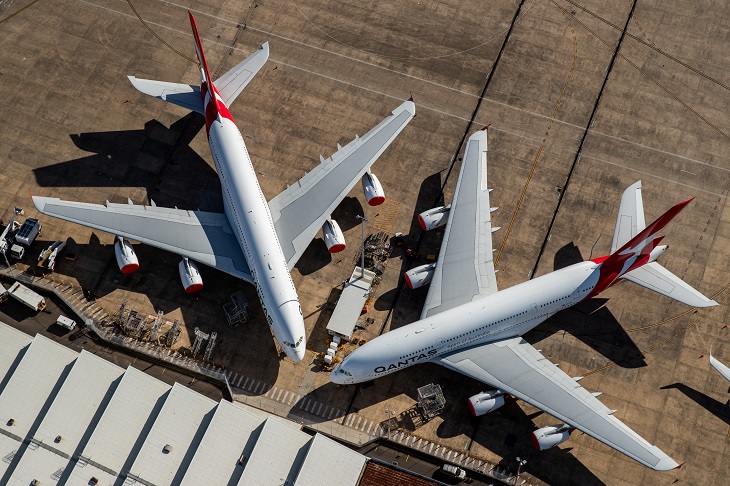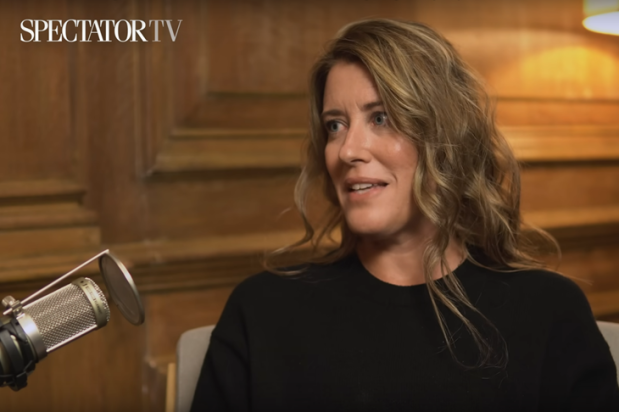Qantas has announced it will be dropping vaccine requirements for international travel starting July 19, (finally) bringing it in line with many other international airlines.
Plenty of fed-up unvaccinated travellers won’t be coming back, if the volume of online outrage is anything to go by. Better late than never though, eh? As one of those former gold-card carrying passengers, I’d rather strap a few albatrosses together than grace the lounge of a business that voluntarily practised discrimination.
While unvaccinated passengers are set to take to the skies, employees of the airline are under strict vaccination orders.
These orders remain in place despite staff shortages that have seen Australia’s airports descend into chaos. Lengthy delays, alarming luggage losses, crowds of ticket-waving parents trying to calm screaming children while queuing to the point no one knows where the queue actually is – a general aura of aggravation has become synonymous with flying in the post-pandemic world.
The hole left by unvaccinated staff has been compounded by ground staff who also lost their jobs over a separate dispute.
Even though airlines are desperate, they have not indicated any intention of welcoming back experienced employees who were sacked for refusing vaccine orders. This is especially true of pilots, who are not easy to come by. Worse, Virgin, Jetstar, and Qantas are fighting some of these unvaccinated former employees in court. It’s not something that screams, ‘We love you, please come back!’
These highly qualified employees are sitting on their hands at home, perusing the Netflix catalogue, because of regulation that makes about as much sense as supermarket staff being vaccinated while plenty of their customers are not.
Science? At the moment, it is about as poorly defined as ‘women’.
‘We appreciate how frustrating flight cancellations and delays are for customers with severe weather in New South Wales and a spike in Covid cases for operating crew impacting airline schedules over the past week,’ said a Qantas spokesperson.
Presumably, that would be a Covid outbreak among the fully-vaccinated operating crew.
Groups of pilots and former employees have sprung up around the world to fight against vaccine mandates. In Australia, the Aussie Freedom Flyers continue the push to dismantle mandates and restore employment to those who were sacked.
In particular, the ‘Magnificent Qantas 24’ (now 19) are former airline employees involved in the fight. A directions hearing for their case took place on July 12, 2022. Submissions of evidence have begun, with another directions hearing scheduled for December 7.
As their site says:
‘Freedoms have to be protected and fought for. This is why we, an all-volunteer group of Australian Air, Land and Sea professionals share a specific mission: to protect our inalienable rights.’
It is worth taking a moment to remember the context of the announcement that lead to the mandating of vaccinations before we look at the group of airline employees challenging the mandate. Qantas Group CEO Alan Joyce said in August of 2021:
‘Having a fully vaccinated workforce will safeguard our people against the virus but also protect our customers and the communities we fly to.
‘One crew member can fly into multiple cities and come into contact with thousands of people in a single day. Making sure they are vaccinated given the potential of this virus to spread is so important and I think it’s the kind of safety leadership people would expect from us.
‘We provide an essential service, so this will help guard against the disruptions that can be caused by just one positive COVID-case shutting down a freight facility or airport terminal.
‘It’s clear that vaccinations are the only way to end the cycle of lockdowns and border closures and for a lot of Qantas and Jetstar employees that means getting back to work again. This was one of the largest responses to any survey we’ve conducted, even with thousands of our people stood down, which shows just how important this is for them.
‘Since vaccines became available, we’ve strongly encouraged all of our people to get the jab and are offering paid time off to get it done. We were really pleased to see from the survey that more than three-quarters of those who responded have already rolled up their sleeve at least once and 60 per cent have had both jabs.
‘Many of our people said they would feel concerned about working with unvaccinated colleagues, which is something that many workplaces across the country are grappling with.
‘We understand there will be a very small number of people who decide not to get the vaccine, and that’s their right, but it’s our responsibility to provide the safest possible environment for our employees and for our customers.’
It is doubtful the entirety (or even the majority) of this argument would stand up today, given infection rates among those with 1-4 shots and the current case curves in major cities around the world.
If the logic doesn’t hold up, why do the mandates remain? Mostly, because workplace regulations are struggling to muddle through emergency pandemic health orders that were not required to be supported by absolute reasoning.
To steal from 1984, 2+2 is allowed to = 5 if the minister has received advice and companies feel it is necessary for the poorly-defined concept of ‘safety’.
This leaves employees (and Australian citizens in general) faced with the bewildering situation where neither a health mandate, nor a company policy, have to be based in irrefutable fact or data – only bureaucratic justification and the powers of the Act. Disproving the statistical merit makes no difference to legitimacy. Health orders are essentially valid because they’re allowed to be made, not because they are necessarily correct.
Worse, secrecy laws were hastily built around National Cabinet to protect the health advice given to Premiers and the Prime Minister from scrutiny. Without these state health orders, company mandates are unlikely to have been instigated. In summary, health orders are a matter of ‘advice’ and as we know, advice has a short shelf life.
This mandate problem can be seen when challenges to NSW health orders were dismissed: ‘It is important to note that the Supreme Court made it clear that the Court’s role was not to assess the merits of the Public Health Orders as a response to the COVID-19 pandemic. Instead, the sole task of the Supreme Court was to determine the legality of the Public Health Orders within the limits of the Public Health Act.’
Challenging anything related to Covid is a legal nightmare.
Qantas, Virgin, and Jetstar were among the first businesses in the country to bring in mandatory vaccination requirements on staff and passengers during the Covid pandemic. Employees, including pilots, were given a short period of time to comply with vaccination orders or have their employment terminated. Those who are challenging the mandates in court refused to give ‘valid consent’ to vaccination and allege that the vaccine order, in their view, constituted a ‘significant material change’ to their existing employment EBA.
The employees terminated have brought a ‘breach of contract’ claim against Virgin Australia and Jetstar to the Federal Court, where their case centres around an alleged breaching of their EBA, the Work Health and Safety Act, Privacy Act, the Australian Human Rights Act, the Discrimination Act, and the Fair Work Act.
The employees involved have expressed their unhappiness about what they feel is an infringement on their human rights that lacked – according to their opinion – meaningful consultation and appropriate individualised risk assessment.
It is not enough for public sentiment to side with opposition to vaccine mandates, or to win ethical body autonomy arguments on social media. The question is not whether the airlines should implement vaccine mandates, it’s a matter of whether they can.
To oppose dismissal, the objection must be found in law.
Nico Burmeister, a barrister acting on behalf of Jetstar and Qantas, said that:
‘They [the documents pertaining to the case] are unintelligible and rambling documents that are inappropriate to take the case any further. In my 20 years of practice I’ve never seen a statement of claim that appears to break every pleading rule. It seems to break all of the rules and every part of it, in my submission, albeit that’s not what I’m asking to be done today, is liable to be struck out.’
He then added that the employees may like to, ‘Have another go to see if they can articulate their claim properly. […] Perhaps if they engage a competent, or any, solicitor, and perhaps counsel, they might be able to articulate their claim.’
This isn’t helped by their lack of funds. As they are out of work, the prospect of gathering money for a legal challenge is daunting.
‘We are all unemployed since our terminations and … not in a position to fund the type of case the respondents are attempting to force upon us,’ said Shane Murdock, who is a former pilot at Virgin.
It is likely that the only pathway back to employment for unvaccinated employees is the court of public opinion. The Qantas Group has shown with its recent announcement that opinion regarding mandates for customers can sway corporate policy.
Freedom Flyer groups have been unifying internationally under the Global Aviation Advocacy Coalition, who raise a range of separate safety concerns following several ‘near miss’ events internationally related to pilot heart emergencies. They are, amongst other things, requesting increased scrutiny on pilot health after vaccination.
‘Covid political decisions damaged the aviation industry’ claims the Global Aviation Advocacy Coalition.
Given the mess Australia’s aviation industry is in, they’re not wrong.
Got something to add? Join the discussion and comment below.
Get 10 issues for just $10
Subscribe to The Spectator Australia today for the next 10 magazine issues, plus full online access, for just $10.


























Comments
Don't miss out
Join the conversation with other Spectator Australia readers. Subscribe to leave a comment.
SUBSCRIBEAlready a subscriber? Log in